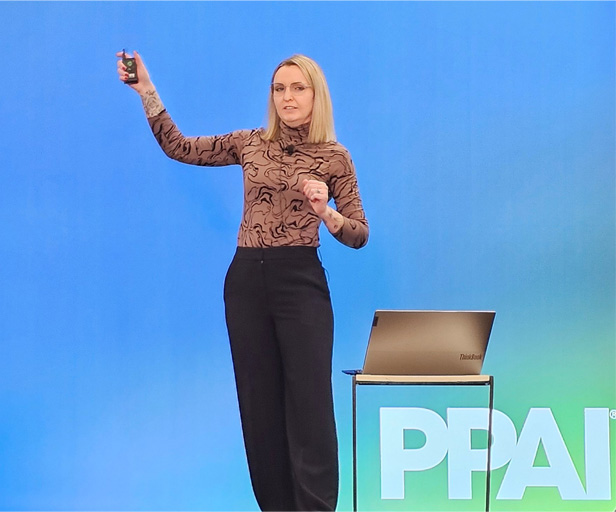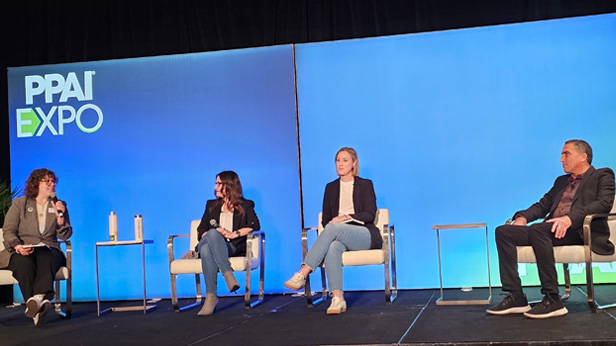Key Takeaways
• Combating Greenwashing in Marketing: Brianna Mazze, vice president of compliance and sustainability at SRG (asi/84592; Canada, 84595), emphasized the importance of avoiding greenwashing and being transparent to build trust with clients.
• Strategies for Sustainable Selling: During a panel discussion, experts advised starting small with sustainability efforts and taking a consultative approach to sales. They suggested integrating sustainable components that align with clients’ goals and not being afraid to challenge clients’ assumptions to promote more eco-friendly options.
• Sharing Practical Tips: Panelists also recommended providing tangible details on how products help the environment, such as using impact scorecards, to make the benefits clear and credible to clients.
Greenwashing – making false, misleading, exaggerated or vague claims about a product’s sustainable attributes – is rampant, both within the promo industry and beyond.
Brianna Mazze, vice president of compliance and sustainability at Counselor Top 40 supplier SRG (asi/84592; Canada, 84595), highlighted the issue and how marketers can combat it during an education session last week at PPAI Expo in Las Vegas.

Avoiding greenwashing – and being transparent – is crucial when selling promo because it’s the key to establishing and building trust with clients, she said. Mazze also shared some telling statistics: 55% of Americans would break up with a brand if they discovered it wasn’t eco-friendly; 42% say they can tell when a company is trying to greenwash; and 44% say they feel more emotionally invested in companies that demonstrate sustainable business practices.
“For distributors, it’s really important that you’re getting claims and information from suppliers,” Mazze said, adding that without knowing a product’s certifications and other specs, a distributor could inadvertently be greenwashing. “It’s really important that we’re leading with trust and authenticity.”
She shared real-life examples of big brands dinged for greenwashing. For instance, Adidas once ran an ad implying that a pair of sneakers would “end plastic waste,” exaggerating that it was 50% recycled, even though only the “upper” part of the shoe was made of recycled content – with less than 25% of the overall shoe content made from recycled materials. The brand would have been better off, Mazze said, if it was clear and specific about the actual percentage of recycled materials used in the product, without resorting to grandiose claims.
The “exaggeration trap,” she added is prevalent in promo. You can’t say you’re “saving the planet with a tumbler,” Mazze said. Instead, “we’re making it a little better,” she said. “It’s important we just be honest about it.”
Other examples of greenwashing include saying a product is sustainable because it’s reusable. “It was always reusable,” she added. “It has to be something differentiating that wasn’t a feature from before.”
How To Win With Eco-Savvy Selling

In another session, suppliers and one distributor shared tips for presenting sustainable product options in every pitch – even when clients might be initially reluctant. Moderated by Elizabeth Wimbush, PPAI’s director of sustainability and responsibility, the panel included perspective from Kate Nash, director of promotional sales and marketing at Raining Rose (asi/80489) and a Promo for the Planet advisory board member; Abe Anteby, founder of Threadfast Apparel (asi/91163); and Mandi Rudd, director of new markets at Counselor Top 40 distributor Genumark (asi/204588).
Sustainability can be daunting, so instead of trying to tackle it all, start small and build from there. “You don’t have to be an expert on every item,” Rudd said. “Pick one thing and be able to talk a little bit deeper about it.”
She suggested taking a consultative approach to each sale, asking questions about the client, the message they want to send and who the end-recipients will be. Then, you can weave in sustainable components of a product that match a client’s end goals.
Don’t be afraid to push back on clients’ assumptions when warranted. “We have a lot of pressure to offer a frictionless sale,” Nash said. “Putting any kind of friction in, there’s a worry that it’s going to make the deal go haywire, but there’s some friction that’s really valuable.”
To that end, Rudd shared a story about a production company that wanted to offer custom branded single-use bottles of water. She explained that while such products are available, she doesn’t sell them. “We really try to limit the amount of single-use plastic we use,” Rudd added.
Instead, she suggested creating a branded water bottle that told the story of the production but also included a “hello, my name is” tag paired with custom Sharpie markers so recipients could personalize the bottles. Plus, Rudd said, a percentage of sales from each bottle goes back to help wounded soldiers. The customer liked the idea so much that they ended up using it for multiple programs. “It’s just a water bottle, but it tells a story and has a giveback,” Rudd said.
Anteby also suggested that distributors get granular in the details of how particular products help the environment – perhaps with an impact scorecard that says buying a particular T-shirt is the equivalent of saving a certain amount of energy or water. “Give your client something tangible they can hang their hat on,” he said. “It demystifies some of the topic.”


